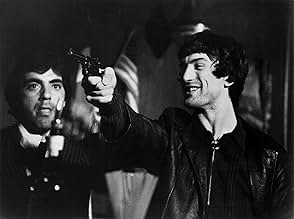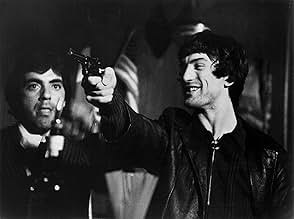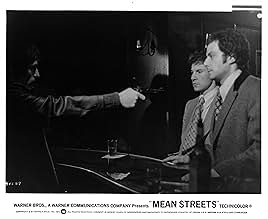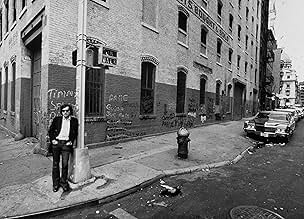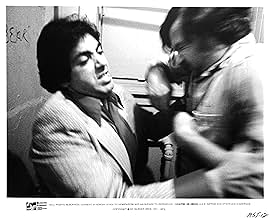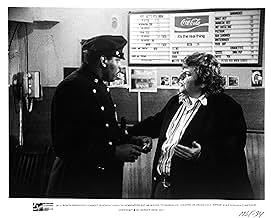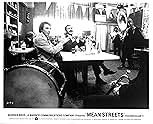Un petit truand aspire à gravir les échelons de la mafia locale.Un petit truand aspire à gravir les échelons de la mafia locale.Un petit truand aspire à gravir les échelons de la mafia locale.
- Récompenses
- 5 victoires et 5 nominations au total
Victor Argo
- Mario
- (as Vic Argo, Victor Argo)
Murray Moston
- Oscar
- (as Murray Mosten)
Commentaire à la une
Scorsese's first film, the interesting catastrophe "Boxcar Bertha," marked his birth as a director, but it was with his second feature, "Mean Streets" that we witnessed the birth of an artist. Most of "Mean Streets" is slightly unfocused with a simplistic plot based around a lot of machismo grandstanding and long bouts of boring dialog (occasionally made interesting by DeNiro's off-kilter star-making turn as Johnny-Boy), with spats of visceral violence (far less gory here than in later Scorcese pics), and a visual bravado that seems slightly less disciplined but no less entertaining than your standard Scorsese crime flick.
Despite its drawbacks (mainly due to youth and inexperience), the template was set. The opening credits (done to the tune of "Be My Baby") suck you right into the film, and the rest of the movie is peppered with Scorsese's loving treatment of popular music that would later become one of his most endearing hallmarks. The basic premise featuring Harvey Keitel as Charlie (the young hood with a heart of gold and conflicted internally by the religion of the Church and the religion of the Streets), Robert DeNiro as Johnny-Boy (the equally loved and hated loose-canon brother figure), and Amy Robinson as Theresa (the woman our hero wants to put on a pedestal as a saint but often treats like a whore), is a trifecta of archetypes we see repeated again and again in Scorsese's films (most obviously in "Casino" with the DeNiro-Pesci-Stone characters, and most subversively in "The Last Temptation of Christ" with Jesus-Judas-Mary Magdalene). The religious iconography, the brotherhood of crooks, the attraction to the gangster lifestyle, the keen eye for depicting violence in artistic and startling ways...these are displayed here in "Mean Streets" in their rawest form.
Though flawed in many ways, "Mean Streets" set the stage and laid the the template for the type of film Scorsese would perfect seventeen years later with "Goodfellas." This heralded the arrival of a new talent and a new genre, and the world of film has thankfully never been the same.
Despite its drawbacks (mainly due to youth and inexperience), the template was set. The opening credits (done to the tune of "Be My Baby") suck you right into the film, and the rest of the movie is peppered with Scorsese's loving treatment of popular music that would later become one of his most endearing hallmarks. The basic premise featuring Harvey Keitel as Charlie (the young hood with a heart of gold and conflicted internally by the religion of the Church and the religion of the Streets), Robert DeNiro as Johnny-Boy (the equally loved and hated loose-canon brother figure), and Amy Robinson as Theresa (the woman our hero wants to put on a pedestal as a saint but often treats like a whore), is a trifecta of archetypes we see repeated again and again in Scorsese's films (most obviously in "Casino" with the DeNiro-Pesci-Stone characters, and most subversively in "The Last Temptation of Christ" with Jesus-Judas-Mary Magdalene). The religious iconography, the brotherhood of crooks, the attraction to the gangster lifestyle, the keen eye for depicting violence in artistic and startling ways...these are displayed here in "Mean Streets" in their rawest form.
Though flawed in many ways, "Mean Streets" set the stage and laid the the template for the type of film Scorsese would perfect seventeen years later with "Goodfellas." This heralded the arrival of a new talent and a new genre, and the world of film has thankfully never been the same.
- WriterDave
- 1 janv. 2007
- Permalien
What Scorsese Film Ranks Highest on IMDb?
What Scorsese Film Ranks Highest on IMDb?
Cinema legend Martin Scorsese has directed some of the most acclaimed films of all time. See how IMDb users rank all of his feature films as director.
Histoire
Le saviez-vous
- AnecdotesFrancis Ford Coppola contributed money to the budget of the film. However, it is rumored that he lent Martin Scorsese $3000 as the Mafia shook him down for using the San Genaro Festival as a backdrop without "permission". It's generally presumed the Mafia uses the all-cash festival to launder money from their ill-gotten gains.
- GaffesYou can see Robert De Niro's mic pack on his back when he gets up to walk to the window at Charlie's house after staying the night.
- Citations
[first lines]
Voice in Charlie's Mind: You don't make up for your sins in church. You do it in the streets. You do it at home. The rest is bullshit, and you know it.
- Versions alternativesNBC edited 10 minutes from this film for its 1977 network television premiere.
- ConnexionsEdited into American Cinema: Film Noir (1995)
- Bandes originalesJumpin' Jack Flash
Written by Mick Jagger (as M. Jagger), Keith Richards (as K. Richards) (uncredited)
By The Rolling Stones
Courtesy of ABKCO Records
Meilleurs choix
Connectez-vous pour évaluer et suivre la liste de favoris afin de recevoir des recommandations personnalisées
- How long is Mean Streets?Alimenté par Alexa
Détails
- Date de sortie
- Pays d’origine
- Site officiel
- Langues
- Aussi connu sous le nom de
- Mean streets - les rues chaudes
- Lieux de tournage
- Sociétés de production
- Voir plus de crédits d'entreprise sur IMDbPro
Box-office
- Budget
- 500 000 $US (estimé)
- Montant brut aux États-Unis et au Canada
- 32 645 $US
- Week-end de sortie aux États-Unis et au Canada
- 32 645 $US
- 15 mars 1998
- Montant brut mondial
- 61 676 $US
- Durée1 heure 52 minutes
- Couleur
- Rapport de forme
- 1.85 : 1
Contribuer à cette page
Suggérer une modification ou ajouter du contenu manquant




















